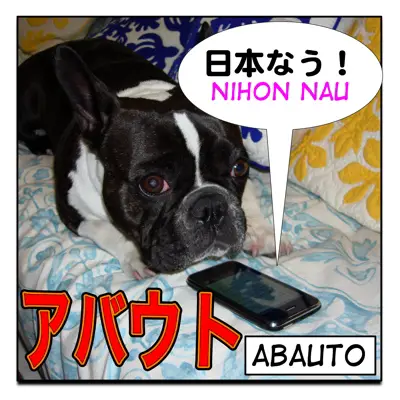「日本なう!」
= Nihon nau!
(Twitter lingo) meaning “I’m in <JAPAN> right now!”
:o 「右と左、どっちが欲しい?」
= Migi to hidari docchi ga hoshii?
= “Which one do you want? The Right one or the left one?”
:maggie-small: 「右!!3ミリ位長いから…」
= Migi!! Sanmiri gurai nagai kara…
= “The right one! ‘Cause it’s about 3mm longer….”
Hi, everyone!
Today we will mainly learn two words. アバウト ( = abaouto) and 細かい ( = komakai)
Let’s take a look at the above picture.
Maggie-sensei is texing a message on Twitter, it says “日本なう”( = Nihon nau)!
日本 ( = nihon/nippon) is Japan. (Hope you know this one. You know Japanese is 日本語 ( = nihongo), right?)
Then what is なう( = nau)? It’s a Twitter lingo.
Twitter is getting bigger and bigger in Japan and many people “tweet” =*つぶやく ( = tubuyaku) on Twitter.
(*The real meaning of つぶやく( = tsubuyaku) is to murmur.)
If you run across Japanese people’s message on Twitter, you will see this word often.
なう ( = nau) is from “now“. Get it? So wherever you are, you can express with なう(=nau),
For example, if you are in Shibuya in Tokyo, you will type,
![]() 「渋谷なう」( = Shibuya nau) which means “I am in Shibuya right now”
「渋谷なう」( = Shibuya nau) which means “I am in Shibuya right now”
If you are in the beauty salon, you will send a text,
![]() 「美容院なう」( = Biyouin nau) I am in a beauty salon now.
「美容院なう」( = Biyouin nau) I am in a beauty salon now.
You can also tell people what you are doing right now.
![]() 「日本語の勉強なう」( = Nihongo no benkyou nau) I am studying Japanese right now.
「日本語の勉強なう」( = Nihongo no benkyou nau) I am studying Japanese right now.
![]() 「カラオケなう」( = Karaoke nau) I am doing Karaoke right now.
「カラオケなう」( = Karaoke nau) I am doing Karaoke right now.
![]() 「飲み会なう」( = Nomikai nau) I am at a drinking party right now.
「飲み会なう」( = Nomikai nau) I am at a drinking party right now.
![]() 「打ち合わせなう」( = Uchiawase nau) I am in a meeting now.
「打ち合わせなう」( = Uchiawase nau) I am in a meeting now.
I think it is an interesting phenomenon using hiragana for western words. I mean we could write “ナウ” instead of “なう” because it is from English word, “now“. But using hiragana could look more comical or cute. Yeah, it supposes to be humorous but there is a writer who uses Twitter for his job and when his house was on fire he tweeted, 「火事なう」( = Kaji now) It doesn’t sound so serious when you word it this way.
Other Twitter related words:
•フォローする = forou suru = to follow
•フォローされる = forou sareru = to be followed
•リツイートする = rituiito suru = to retweet
•フォロー返し = forou gaeshi = to follow someone in return, to follow back someone
!to right! If you want to learn more about Twitter expressions, go check
:u:
ツイッター用語 = Twitter yougo = Twitter net slang lesson.
Anyway, going back to the line in the picture, 「日本なう」( = Nihon nau) means “I am in Japan right now.”
If you read this kind of message, you would think,
「日本って。。。日本のどこ?」( = Nihon tte… Nihon no doko? ) “What do you mean Japan!? Where exactly in Japan?”
Or we say 「なんてアバウトな….」 ( = Nante abauto na…) “How roughly mentioned…”
So today’s first word is アバウト ( = abauto). It is written in Katakana. This comes from a English word. Can you guess what it is?
Yes, it comes from “about“. It is a very colloquial word.
If someone or something is described as アバウト ( = abauto) it means they are very vague, rough or loose.
For example, you are making a cake with your friend.
•「ねえ、お砂糖どのぐらいいれればいいの?」
= Nee, osatou doregurai irereba iino?
= ”Hey, about how much sugar should I put?”
•「アバウトでいいよ。」
= Abauto de iiyo.
= No need to be so precise. Whatever..Just put the amount as you think it is proper.
That means, whatever you feel like, you don’t need to be so precise.
We also say:
•「適当でいいよ。」
= Tekitou de iiyo
•「大体でいいよ。」
= Daitai de iiyo.
You can also ask,
「ねえ、アバウト/大体/適当でいい?」
= Nee, abauto/daitai/tekitou de ii?
= “Hey, I don’t need to be too precise? Can I just use my judgement?”
•アバウトな数 ( = abauto na kazu) round figure, ballpark figure
•「明日のパーティー、アバウトでいいから何人位来るの?」
= Ashita no paatii, abauto de ii kara nannin gurai kuru no?
= “Around how many people are coming to the party tomorrow? Just give me a ballpark figure.”
A person who is nonchalant and who is never got caught up in details is called
![]() アバウトな人 ( = abauto na hito)
アバウトな人 ( = abauto na hito)
•「彼まだ来ないよ。」
= Kare mada konai yo
= He is not here yet.
「あの人はアバウトだからね。」
= Ano hito wa abauto dakara ne.
= That guy is undependable.(Implies he has never been on time or punctual. )
The synonyms of アバウトな人 ( = Abauto na hito) could be
•適当な人 ( = tekitou na hito)
•いい加減な人 ( = iikagen na hito)
but these two imply an air of “irresponsibleness” . So if you say アバウト ( = abaout) it sounds like a joke and make it sound less serious.
Also アバウト ( = abauto) is used for people who are clumsy and not suited for jobs that require meticulous attention.
Sometimes you can describe yourself as アバウト ( = abauto) to be humble.
•「ごめんなさい、私ってアバウトだから…」
= Gomennasai watashitte abauto dakara…
= I am sorry I am a bit rough so…
•アバウトな性格 = Abauto na seikaku = A personality which is rough.
Synonyms:
•大雑把/おおざっぱ ( = oozappa) (a bit negative)
![]() adjective : おおざっぱな ( = oozappana) + ex. 性格 ( = seikaku) personality
adjective : おおざっぱな ( = oozappana) + ex. 性格 ( = seikaku) personality
![]() adverb : おおざっぱに ( = oozappani) +verb
adverb : おおざっぱに ( = oozappani) +verb
•大まか ( = oomaka)
![]() adjective : 大まかな ( = oomakana) + ex. 数字 ( = suuji) number
adjective : 大まかな ( = oomakana) + ex. 数字 ( = suuji) number
![]() adverb : 大まかに ( = oomakani) +verb
adverb : 大まかに ( = oomakani) +verb
•雑 ( = zatsu) (negative)
![]() adjective : 雑な ( = zatsu na) + ex. 仕事 ( = seikaku) work
adjective : 雑な ( = zatsu na) + ex. 仕事 ( = seikaku) work
![]() adverb : 雑に ( = zatsuni) +verb
adverb : 雑に ( = zatsuni) +verb
They all mean “rough” or “loose” or “careless”:
Ex. 大雑把な(or アバウトな)説明しか受けていない。
= Oozappana (→abauto) na setsumei shika ukete inai.
= They just gave me a rough explanation.
Ex. 彼女の料理はいつも雑(→ アバウト)だ。
= Kanojo no ryouri wa itsu mo zatsu (→abauto) da.
= Her cooking is always just thrown together.
Ex.おおまかな (or アバウトな)やり方で作る。
= Oomaka( (→abauto)na yarikata de tsukuru.
= To make something in a rough way
Now let’s take a look at the second picture above:
The opposite of アバウトな性格 ( = abauto na seikaku) is 細かい ( = komakai) meticulous.
You go out with Maggie-sensei for dinner. It costs 1,570 yen in total.
You’d better bring exactly 785 yen because…
![]() マギーは細かい。
マギーは細かい。
= Maggie wa komakai.
![]() マギーは細かい性格だ。
マギーは細かい性格だ。
= Maggie wa komakai seikaku da.
= Maggie is picky about money.
細かい ( = komakai) means “details”
So細かい人 ( = komakai hito) means a person who is too concerned about details or is too meticulous.
几帳面 ( = kichoumen) is used to describe a person who is meticulous but 細かい ( = komakai) is a bit more negative than 几帳面 ( = kichoumen)。
Ex.「細かいことを言う様だけど」
=Komakaikoto wo iu you dakedo
= I don’t want to nitpick but… / Not to split hairs but…
Ex.マギーは細かいことにうるさい。
= Maggiwa komakai koto ni urusai
= Maggie is a nitpicker
But if you say, 細やか ( = komayaka), it means sensitive or attentive.
Ex.マギーは細やかな性格だ。
= Maggie wa komayaka na seikaku da.
= It is positive and means she is very attentive or sensitive in a good way.
 マギー先生より = Maggie-sensei yori = From Maggie Sensei
マギー先生より = Maggie-sensei yori = From Maggie Sensei
ツイッターフォローしてね。= Tuittaa forou shitene = Follow me on Twitter!
ほぼ、毎日、つぶやきます!( =Hobo mainichi tsubuyakimasu!) I tweet almost every day.
***
Will you be my Patron?
I appreciate your support! サポートありがとう!



10 Comments
Hallo~ boucingheart!
Could you may do an updated version of your slang lessons?
I wanna start to be more casual/slangly with my frends since they always ”complain” about my stiff/over polite way of speech.. but i am not sure what is still common and what is not O.O
@Kurosaki
Hi, Kurosaki
Check my latest lesson.
Japanese slang words and colloquial expressions.
I notice Japnanese people tweeting in English use nau instead of now.
@Jeremy
You know why なう! :)
interesting that hiragana is more cute/comical^^ yappari it makes sense ne? the hiragana stroke lines are much softer than katakana^^ katakana is so edgy and sharp ne^^
my best japanese friend told me I m “hazukashi no seikaku” I don’t know if that’s good or bad but she thinks it’s kawaii dakara :)
@Aki
That’s right. You have a nice observation. Hiagana is more round and it looks softer.
Akiは日本人の親友(しんゆう= best friend)がいるのね。よかったね〜!
un :) she’s from Kyoto–> Kansai ben meccha meccha kawaiiyo!!! suki yanen (^_^)
@Aki
I love kansaiben,too!! If you get used to her accent, you won’t have any problem understanding “owarai” = Japanese comedies.
実は私はTwitterのことについてあまり知りません。
FacebookのAccountがありますけど、それもあまり使いません。
それでも、このレッスンは私にとってまだ面白かったんです。
突然にJEJEMONを思い出した。
それはフィリピンで新しい生じたSubcultureです。
時間があれば、ぜひこのLinkを読んで下さい
http://en.wikipedia.org/wiki/Jejemon
LadySaphhire-san
Jejemon初めて聞きました。教えてくれて有り難う。ちゃんと読みましたよ。日本ではMixiとかありますが、今は手軽だからtwitterの方が人気あるみたい。私も毎日 Twitterでミニレッスンしてるからまたよかったらチェックしてね。http://twitpic.com/photos/MaggieSensei
(Note : 突然に→突然)
またフィリピンのこと教えてね。